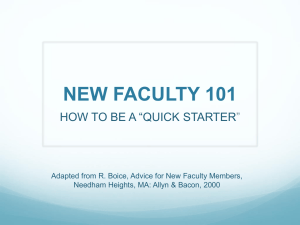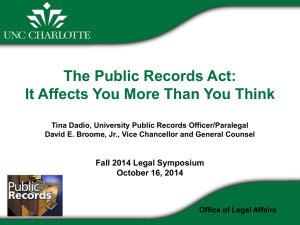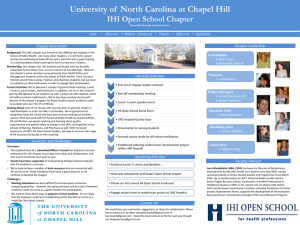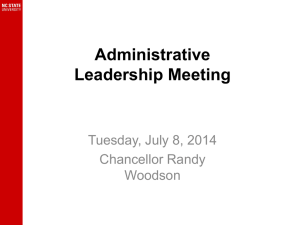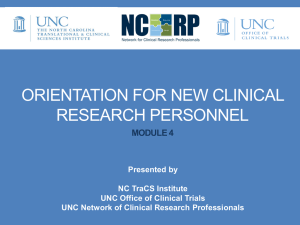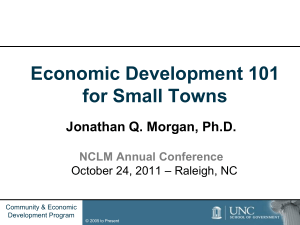Strategic Objectives and KPIs
advertisement
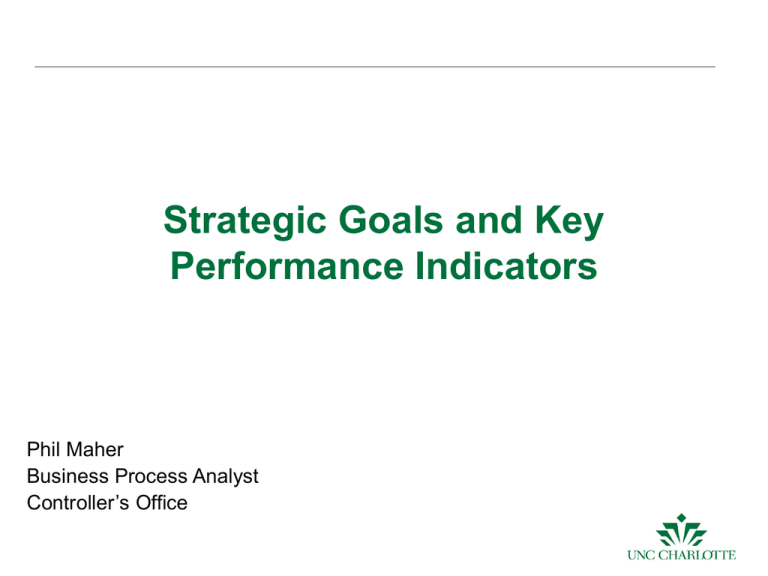
Strategic Goals and Key Performance Indicators Phil Maher Business Process Analyst Controller’s Office Objectives of This Session • In this session we are going to: – Define what business goals are – Understand what Key Performance Indicators (KPIs) are Strategic Plans/Goals What Comes First? 1. Mission 2. Vision Then: 3. Strategy 4. Operations 5. Tactics The Big Picture • Mission- the what, what is the University trying to achieve? – Who are our customers? – What do they expect? • Vision • Strategy-the how • Goals-targets you wish to reach Mission • The Big Picture • You can’t get to where you’re going if you don’t know when or how to get there UNC System Charlotte Mission Statements What’s Your Unit Mission? • What do you do? • Usually stated in General Terms • UNCC Examples • • • • • Business Affairs Mission Vision Academic Affairs Goals Facilities Management Mission Technical Operations and Planning Internal Audit Mission • Relates to service • Relates to the type of results you wish to achieve Strategic Plans UNC System Strategic Plan 2013-2018 Brochure UNC Charlotte Institutional Plan 2011-16 Academic Planning 2011-2016 Facilities Management Strategic Planning Strategic Plan for Research Growth at UNC Charlotte Appalachian State Strategic Plan UNC System and UNC Charlotte Goals UNC System Goals UNC Charlotte Goals Setting degree attainment goals responsive to state needs Deliver high quality, affordable and effective educational programs that produce educated and responsible citizens and a competitive workforce Strengthen academic quality Stimulate increased research, creative activities and community engagement with a focus on programs and partnerships that address the major needs of the Charlotte region Serving the people of North Carolina Enhance opportunities for learning and working together in a socially and culturally diverse world Enhance the quality of campus life and the collegiate experience for students and other members of the campus community, both on-campus and in adjacent University City neighborhoods. Build local, state, and national awareness of and respect for the work of the University and its people. UNC System and UNC Charlotte Goals UNC System Goals UNC Charlotte Goals Maximizing efficiencies Improve the readiness of human resources and our academic, administrative, physical, and technological infrastructure to efficiently and responsibly operate an urban research university serving 35,000 students. Ensuring an accessible and financially stable Improve significantly the base of supplemental non-state revenues for University academic programs and administrative support, physical facilities, and student development, particularly need-based student financial aid. UNC Charlotte Research Strategic Plan Goals 1. Focused Research- To put resources and infrastructure into place to support a finite number of large-scale focused research areas 2. Emerging Research- To provide a menu of services and resources to support faculty in all disciplines as they pursue new research efforts and develop as nationally prominent scholars. 3. Collaboration and Culture- To provide programs, services, and resources that promote collaboration and a culture of research. 4. Alignment- To provide programs, services, and resources that connect UNC Charlotte research goals and outcomes with regional and national objectives that impact social, cultural, and economic communities. 5. Customer Service- To be highly responsive to the needs of faculty, student, and partner research efforts and be known for efficient and friendly customer service. 6. Research Integrity- To provide programs, services, and resources so that all UNC Charlotte researchers can operate with integrity and satisfy all requirements for research. What are Your Unit’s Business Goals??? • Where does your unit fit in with the University Mission and Goals? • Chancellors Convocation Addresses – Chancellor's Convocation Addresses 2005-11 • What’s the unit mission • What do your customers expect? • Business goals have these characteristics – They are specific – They are measureable – They have a timeframe – They are attainable – They make sense Where Do Your Top 5 Goals Come From? • What are your critical success factors? • • • • • • • • • • Increased customer satisfaction? Improved cycle time? Improved graduation rates? More research $$$$$? Look at your units process functions, activities and task documents Can you identify your main process functions? What do you think they are? How is your unit evaluated? How are you evaluated? Chances are these are also your top goals and objectives Create a Vision for Your Unit • • • • Begin with the end in mind What are we trying to accomplish? Are we doing the right things? What are the top five goals of your unit? – Short Term? – Long Term? • Rank them in order of importance • What does management think are your top 5 goals? – If you don’t know-ask • What is the desired result? – What do you expect? • Who are your customers? • What do your customers expect? – If you don’t know-find out – Financial Services Survey The Details • • • • Execution-the action, deliver the strategy Tactics/Process-doing Measure-KPIs-how are we doing Improvement-what are the gaps between the goals and the actual results Questions? Process How do Process Functions and KPIs Relate? • Which process functions have the most effect on; • • • • Students Faculty Staff The financial outcome of the University • Are they your core (most important)process functions? • Set performance measures for those process functions and monitor how the improvement of those process functions affects the overall financial performance over time Application: • Review your process functions and identify potential KPIs • Flowchart - Payroll.pdf 49er Mart Flowchart 19 Key Performance Indicators What Can We Learn from Moneyball? • • • • • • • Who has read the book or watched the movie Moneyball? What’s the premise? What are they trying to achieve? What’s the goal of a baseball game? What indicators did they use? Was everybody using the same indicators? Did it change the way people think? How can we apply those concepts to your unit? People, Process, Technology, Decisions Align People, Processes and Technology to performance goals that drive the mission • People (don’t forget about the employees and customers) • • Align employee performance to organizational goals Is educating your employees a critical success factor? • Process functions • • Improve processes to maximize efficiency and minimize costs Manage cross functional processes between support groups • Technology • • Map IT performance to organizational goals Integrate performance data with budget forecast and strategic goals • Decisions • Develop performance measures that drive decision making Why Do We Need KPIs? • Sets the relationship to the University strategic plan, goals and objectives • What gets measured gets done!!!!! • Drives improvement by fact not guesswork • Evaluates where we are and where we want to be • How are individual members of the team performing? • KPI is a metric but a metric is not always a KPI Keys to the Right Indicators • • • • • • • • • • • Aligned-integrated into the University strategic goals and objectives Owned-assigned to a specific group of employees Predictive-Forecast capabilities Based on legitimate data Actionable Not too many- 4 to 5 at most (related to your process functions) • Each unit can have their own KPIs if you desire Easy to understand Balanced and linked-Reinforce not undermine each other Relevant Targets can be applied to them Drives decision making KPI Categories • Financial • Cost per unit • Process • Cycle time-the whole process not just one of multiple units • Employee Growth and Learning • • Hours of training Use of Technology • Customer-Students, other University employees, other University units • • • • Complaints, number and type Student success (graduation rates) Student Retention Student Debt Load Leading and Lagging Indicators • Leading indicators evaluate actions influencing future results of the work • Customer satisfaction • Lagging indicators measure results of past work • Measure against a pre-specified benchmark Does Your Unit Collect the Data?????????? • • • • • • Can the data be collected? How easy (hard) is it to get? Who has it? Is it automated? Is it understandable by your unit? Does it tell the story? Operational (Activity) Performance KPI Examples • • • • • • Effectiveness- FTE per unit of output Efficiency-Cost per unit of output, cycle time Customer satisfaction-survey Accuracy-Error rates Quality-Personnel Performance-all of the above by employee Compliance-Audit findings (Internal and External) Your Unit has KPIs Now What? • • • • • KPIs should not be an end in themselves, it’s a management tool Review your KPIs regularly Do they still tell the story? If not go back to the drawing board Realign with the University mission, goals and strategy Alignment Grid UNC System Unit Unit UNC System UNC UNC Charlotte Division Division SubSub Division Charlotte Mission Mission Vision Vision Goals Goals Objectives Objectives Core Process Functions Processes Core Processes KPIs Process Functions/Activities/ Tasks KPIs Division Examples • Examples: • UNC-GA FIT KPIs • UNC Charlotte General Accounting KPIs • UNCC Ratios FY03-FY12 • UNCC Facilities Management Balanced Scorecard • Appalachian State Strategic Plan • Missouri State KPIs • Northeastern Illinois KPIs • Key-Performance-Indicators-for-Administrative-Support-Units • University of North Texas • Penn State Strategic Performance Indicators • Recurring Allocation Reduction 2013-14 • UNCC Grad and Retention Rates to Peers How can we help you? • Contact us • Laura Williams Compliance Manager • LauraWilliams@uncc.edu • Phil Maher Business Process Analyst • pmaher1@uncc.edu • Greg Verret Business Process Analyst • gverret@uncc.edu Questions???? E-Commerce and the University Mission, IP and BA Goals UNC Charlotte Mission Statement-Serve as faithful stewards of the public and private resources entrusted to us and provide effective and efficient administrative services that exceed the expectations of our diverse constituencies. Institutional Plan 2011-16 University Goal #4 Improve the readiness of human resources and our academic, administrative, physical, and technological infrastructure to efficiently and responsibly operate an urban research university serving 35,000 students. Objective 3.2 -Continue to identify and invest in priorities for strengthening the capacity and reliability of the institution’s information technology infrastructure through the work of the IT Portfolio Investment Review Board. Business Affairs Goal #4-Re-engineer and/or create major business processes to reduce cost, raise customer service levels, and ensure compliance with legal and regulatory standards. Design and create new processes to address the rapidly changing needs of the University. Business Affairs Goal #5-Leverage technology to increase productivity, reduce cost, raise customer-service levels, and ensure compliance with legal and regulatory standards. E-Commerce • Convocation Addresses (the future of UNCC) Individual campuses are operating as efficiently and effectively as possible (2005) 35,000 students by the year 2020 (2007) and associated support services (1,600 more next year to make it 26,900 in Fall 2012) means adding 1,000 per year for the next 8 years We aspire to create a seamless customer-service organization with clearly communicated processes and procedures. (2008) Football Alternative ways of generating revenue beyond the state dollars we receive We seek to push ourselves to private fundraising that exceeds $25 million (2009) re-engineer our capacity to raise gifts through our Annual Giving program (2009) Parking increases (2010) TR from being paper-based to being fully electronic (2011) Personnel related processes fully electronic 36,000 UNC Charlotte donors including the development of metrics to hold ourselves accountable for judging what’s working and, just as importantly, what’s not. E-Commerce Transactions (including ACH) • What does a successful E-Commerce operation look like? Describe it….. • If you could have it anyway you wanted (create it from scratch) • Number of transactions • Dollar value of transactions • Per ($ and #) 1000 students (25277) and faculty/staff (2903) (headcount) • Expected growth if nothing changes • Number of merchants • Targets • Speed of realizing revenue versus checks or cash • Adopt to change • UNCC org structure UNCC Revenue Sources • • • • • • • • • State Appropriation- 40% (2011) Tuition and Fees- 27% (2011)- $131 million Auxiliaries Sales and Service- 10% (2011)-$ 48.5 million Grants- 6% (2011) Non Capital Gifts and Grants- 15% (2011)- $71.5 million Investment- 1.6% (2011) Other- .4% (2011) Total Revenue $480.7 million Revenue to be analyzed for e-commerce activity- $251 million (52% of total) • Auxiliaries (sales and service), Tuition, Other Merchant, Gifts Determine a Realistic Goal for E-Commerce • Who are your customers? • • • • Students? Faculty? Staff? Other Stakeholders? • • • • • • • • • State PCI Management What do they expect? $251 million + in revenue to be analyzed Current E-Commerce activity What’s the goal? How much in ACH? How much in credit/debit card activity? Other Thoughts E-Commerce • • • • Branding Ease of Navigation Performance Ability to make changes quickly • • • • • • • • Changes on the horizon Traffic to the site Size of average sales ticket Customers who return to the site What do we want the sites to accomplish Target audience Reduce costs increase speed Technology changes in the next 5 years, how does it impact the operation • Regulatory compliance • In relation to the strategic objectives Institution Mission Vision and Goals Academic, Student Life, Administrative or Service Unit Mission and Vision Beneficiaries and Constituency Needs and Expectations Opportunities and Challenges Resources Mission Critical Programs and Services Operational and Support Programs and Services

